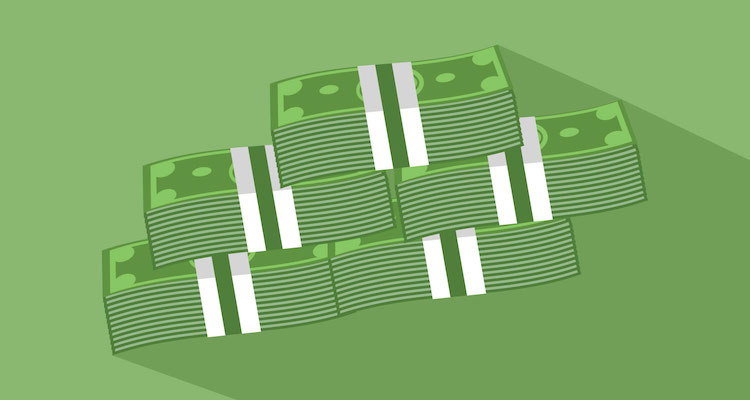One of the most important financial concepts is cash flow.
Many of us would like to think that our money issues can be solved with the help of a bigger income. However, the reality is that cash flow is just as important as the money coming in. A bigger income does nothing for you if you aren’t aware of how money is moving through your personal economy.
Understanding cash flow is essential to getting on top of your finances and finding long-term financial success. Whether you are managing your personal finances or figuring out how to build a profitable business, cash flow management is essential.
Table of Contents
ToggleWhat is Cash Flow?
Basically, cash flow is the way money moves through your personal economy.
It’s a way for you to see how things are going financially quickly and easily. You can track how you use money.
When looking at your cash flow, you look at your income and expenses. You pay attention to how much money you have coming in, as well as where that money is going out.
Positive cash flow is when you have more money coming in than going out. Your goal should be to develop positive cash flow. That way, you know that you are living within your means and that you have extra money available to you.
Negative cash flow, on the other hand, is what you end up with when you have more money going out than you have coming in. If you repeatedly have months with negative cash flow, you end up in debt and unable to pay your bills.
It’s important to get an idea of where you stand and pay attention. Your ultimate goal is to become cash flow positive so that you know you have the resources available to you so you can meet your goals.
Timing and Cash Flow
One important aspect of cash flow is timing.
While we often talk about inflows and outflows in terms of what’s happening in a particular month, it’s easy to forget about timing.
Timing is about when you get the money relative to when the money goes out. And this can be just as important as how much money you end up with each month.
A mortgage payment is a good example. Maybe your mortgage is set to come out of your account on the 12th of the month. However, you are paid on the 1st and the 15th of each month. What happens if you get to the 12th and you are $100 short of your mortgage payment?
It doesn’t make you feel super-great if your overall month is going to even out when your bank sends back your mortgage payment due to insufficient funds. Not only does it get sent back, but you also often end up with fees. Your bank and mortgage company might both hit you with fees.
This can happen with insurance, car payments, and even utilities. If your bills don’t match up with your income, you are more likely to miss payments on occasion or run into other problems.
Pay attention to the timing. When possible, I like to make sure that I divide up my bills according to when I’m likely to have the money. That allows me to split up my expenses and smooth my cash flow a little bit.
When I can better match up my expenses with my income, it allows me to have fewer missed payments. I save money on fees and I don’t have to worry as much about my payments being sent back.
Timing is a big deal and it’s vital that you stay on top of the situation if you want to avoid the problems that come when things are a little off.
Planning Ahead
Of course, if you want to make sure that your cash flow works out properly, you have to plan ahead.
Look forward to your bills and other obligations. Do you have debts that you are making payments on? What about groceries? Can you budget for those types of costs?
Don’t forget about regular expenses that might come after longer intervals. Maybe you only pay your car insurance premium every six months. Perhaps your child plays tennis for school. You know that you will have expenses related to that activity every spring, even if it’s not something that you plan for each month.
Make it a point to save a little bit regularly so you are ready for those types of expenses and it doesn’t throw your cash flow off.
I do something similar with taxes. I set aside a set amount of money each month meant for make estimated payments. When my quarterly taxes are due, I can just pay them.
As you plan your money, whether it’s your personal life or for your business, it’s a good idea to pay attention to cash flow. Look ahead at what might be coming out, and prepare for it. You’ll be in much better shape in the long run.
Backup Plans to Smooth Cash Flow
Even when you plan ahead and generally experience positive cash flow, you can end up in a situation where you feel the pinch.
It’s a good idea to have backup plans to manage your cash flow.
One of my main backups is to have a line of credit connected to my checking account. I’m a freelancer, so my income is variable. As a result, sometimes I am paid late. I don’t always know when the money will show up.
With the line of credit, money is automatically moved into my checking account. I pay interest on the amount if I carry a balance. However, if I immediately pay off the amount borrowed as soon as the client pays, I don’t have to worry about the interest. It’s much better than paying a $38.50 returned payment fee to my bank.
You can create other backup plans to smooth cash flow. One idea is to have an emergency fund in a savings account that allows you to quickly move money into your checking account if needed.
I know other people who use credit cards for all their expenses. They pay off the cards each month so they don’t have to worry about interest. Plus, it also means they don’t have to worry about making the payment until the money is in the bank. As long as you are careful only to spend within your budget, this system can be a good one.
What About Automation?
Automating your finances can be a good move. It means your bills are paid, even if you aren’t in town to take care of it on your own.
However, you do need to be careful. In some cases, automation can be problematic to your cash flow. If the money isn’t there, but the attempts are made to withdraw the money, you can rack up fees quickly.
If you automate, make sure that your cash flow is set up so that you are less likely to have problems down the road.
Once you have a handle on your cash flow, you can start making better decisions with your money, and you are more likely to see long-term financial success.
















